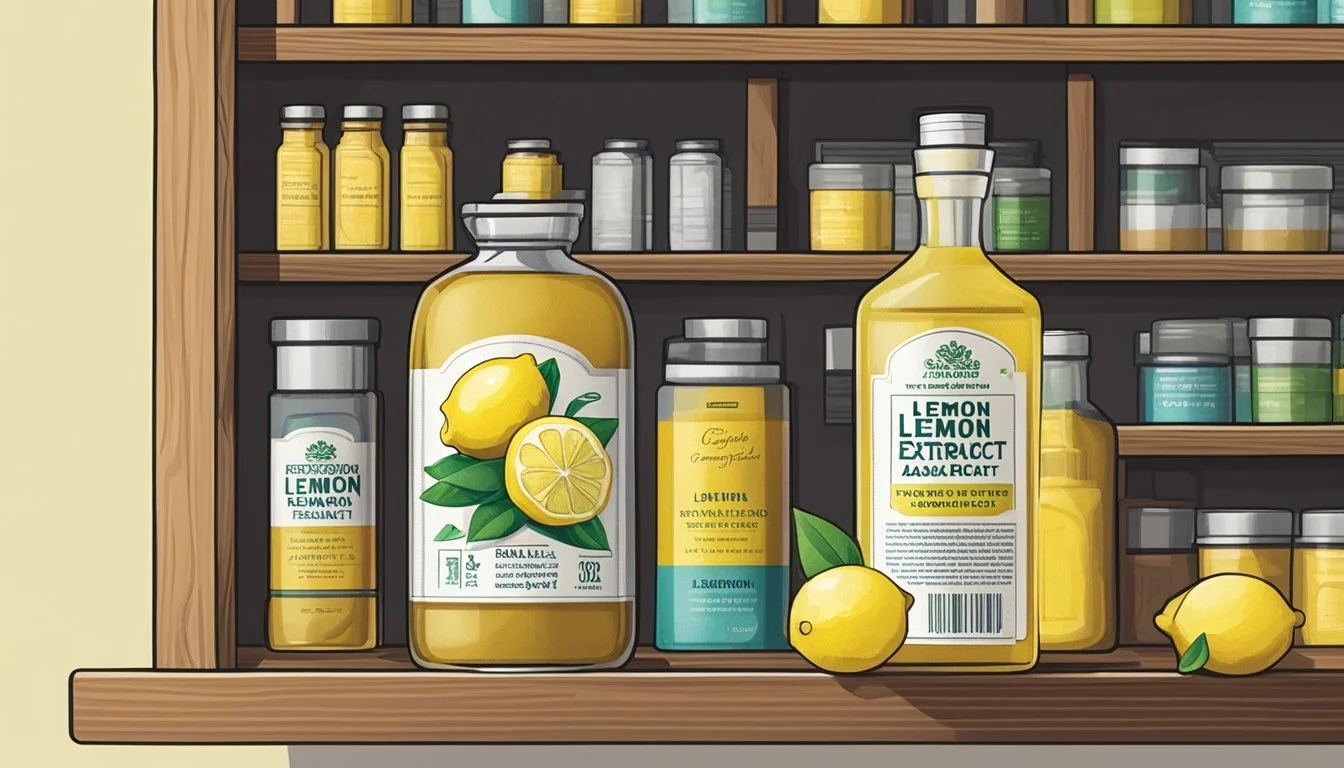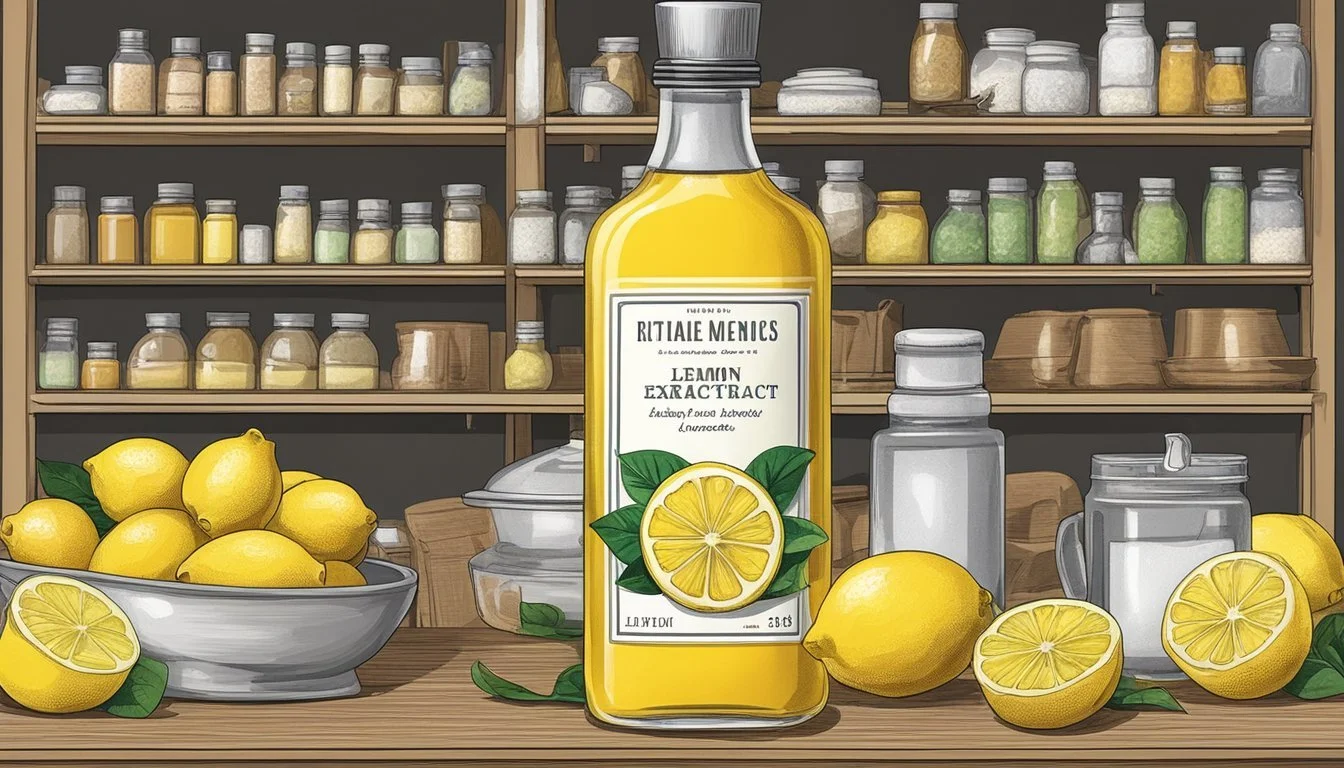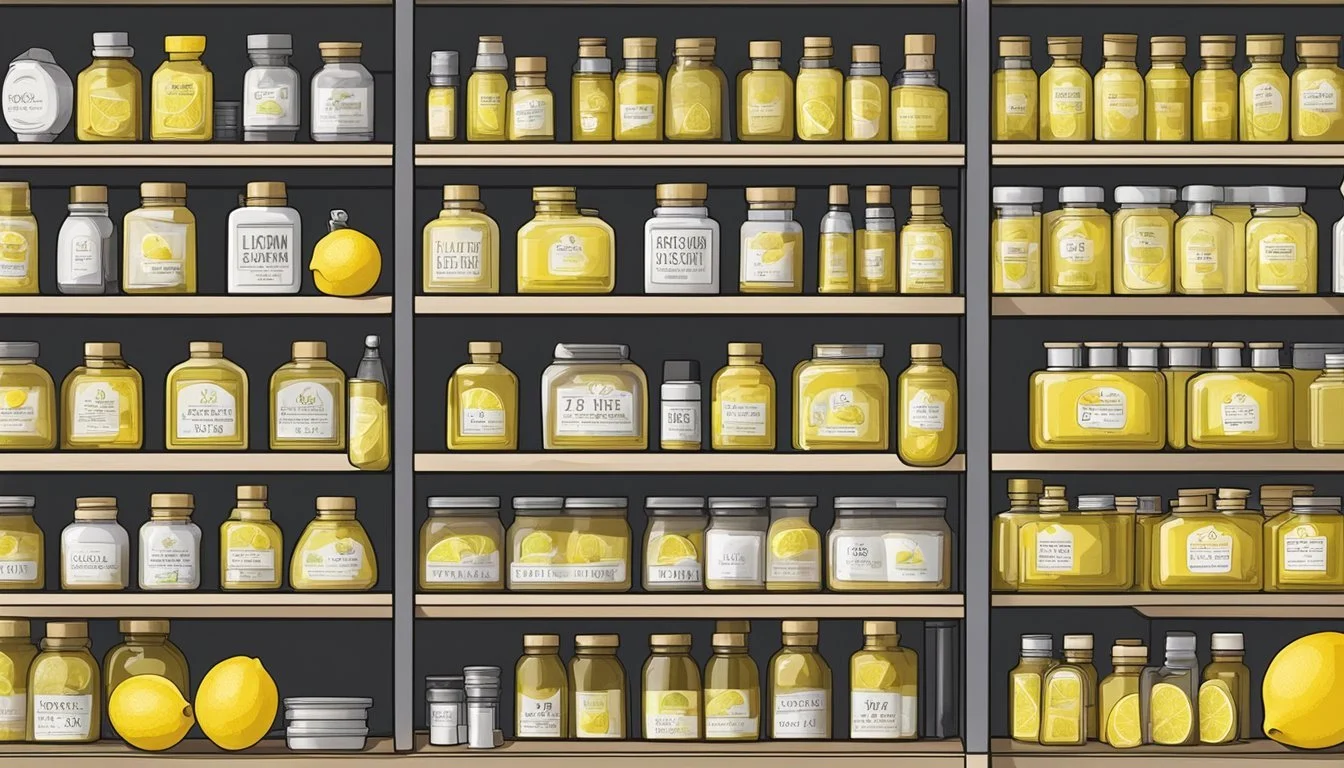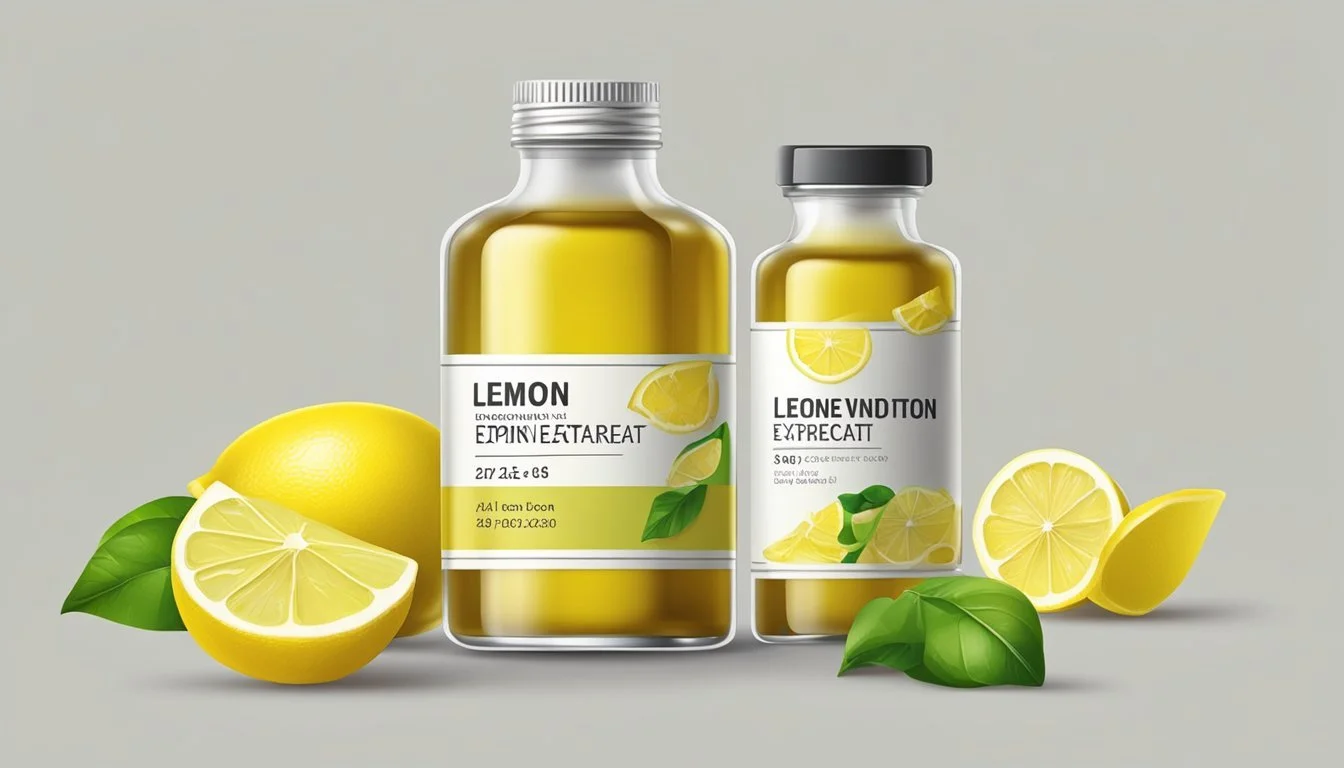How Long Does Lemon Extract Last?
Understanding Shelf Life and Storage Tips
Lemon extract, a concentrated flavoring made from lemon peel oil, is a staple in many kitchens for its ability to infuse foods with a bright, citrusy flavor. The shelf life of lemon extract, like other extracts, is influenced by the conditions under which it is stored. Unopened and properly stored in a cool, dry place, it remains at best quality for about 3 to 4 years thanks to its high alcohol content, which acts as a preservative.
Once opened, the quality of lemon extract can begin to diminish. It's advised to keep the container tightly closed to minimize exposure to air and moisture, which can accelerate degradation. While the potency of the flavor may decrease over time, lemon extract typically remains safe to consume past its "expiration" date, provided it has been stored correctly and shows no signs of spoilage.
Even past its prime, lemon extract can often still be used, although it might require a larger quantity to achieve the desired flavor profile. Users should rely on the manufacturer's expiration date as a general guideline but also employ their senses to assess the quality of the extract before use. If the aroma is weak or has changed, or if visual signs of spoilage are present, it may be best to replace the bottle to ensure the integrity of the flavor in culinary applications.
What Is Lemon Extract?
Lemon extract is a stable flavoring agent made using lemon zest (how long does lemon zest last?), which is crucial for recipes requiring a potent lemon flavor.
Defining Lemon Extract
Lemon extract is made by soaking lemon zest, or the colorful outer skin of the lemon, in a base of alcohol. The alcohol acts as a solvent, drawing out the oils and essences from the zest, which contain the lemon's volatile flavor compounds. This results in a highly concentrated lemon flavor that is used in small doses in various culinary applications.
Lemon Extract vs Lemon Juice
While both lemon extract and lemon juice are derived from lemons, they serve different culinary purposes. Lemon juice is the tart liquid pressed from the fruit, used for its acidic properties and mild citrusy flavor. It adds not just flavor but also moisture to dishes and beverages like lemonade. In contrast, lemon extract focuses solely on providing a strong lemon flavor without the acidity or moisture, making it ideal for baked goods and other recipes where a pronounced lemon essence is desired.
Lemon Extract vs Vanilla Extract
Lemon extract and vanilla extract are both used to add concentrated flavor to recipes. Lemon extract offers a vibrant, citrusy taste characteristic of fresh lemons. Vanilla extract, on the other hand, imparts a sweet, floral flavor derived from vanilla beans. Both are made by infusing their respective flavor components, lemon zest for lemon extract and vanilla pods for vanilla extract, into an alcohol base. They are not interchangeable due to their distinct flavors but are similarly utilized in small quantities for their strong, essential oils.
The Importance of Storage
Proper storage is essential to maintaining the quality and extending the shelf life of lemon extract. By adhering to the best storage practices, individuals can ensure that their lemon extract remains potent and flavorful for as long as possible.
Ideal Storage Conditions
Lemon extract retains its optimal quality when stored in a cool, dry, and dark place such as a cupboard away from any sources of heat. It is crucial that the container is tightly sealed to prevent the evaporation of the alcohol base, which is responsible for preserving the extract's flavor and acidity. The ideal storage conditions can be summarized as follows:
Temperature: Maintain at room temperature or slightly cooler.
Light: Keep in a dark storage area to prevent degradation by sunlight.
Humidity: Store in a dry location to prevent moisture build-up.
Effects of Improper Storage
When lemon extract is exposed to less than ideal conditions, its quality can degrade more rapidly. Direct sunlight or exposure to heat can cause the flavors to break down and potency to decrease. Likewise, storing the bottle in a place where there's moisture can lead to a compromised seal, introducing contaminants that could spoil the extract. Signs of improper storage include:
A loss of the extract's vibrant citrus scent and robust flavor.
Changes in the appearance or color of the liquid.
Maintaining the integrity of lemon extract relies heavily on adhering to the recommended storage guidelines, shielding the aromatic compound from elements that accelerate degradation.
Determining Shelf Life
The shelf life of lemon extract hinges on proper storage and whether it is commercially produced or homemade. In the context of lemon extract, shelf life refers to the duration the extract retains its best quality.
Commercial Lemon Extract Shelf Life
Commercially manufactured lemon extract typically boasts a shelf life of 3 to 4 years when stored properly. Best by and expiration dates on packaging serve as useful guides for peak quality. However, it may remain safe to use beyond these dates if it still smells and tastes fresh.
Homemade Lemon Extract Shelf Life
Homemade lemon extract, while devoid of preservatives found in store-bought versions, can last up to 2 years. The alcohol content plays a critical role in its preservation. Its quality largely depends on the alcohol and the purity of ingredients used.
Shelf Life Indicators
Key indicators of a compromised lemon extract include an off odor, unusual flavor, and altered appearance. While these signs may not necessitate immediate disposal, they do suggest the product is past its peak quality and should be used with caution.
Using Lemon Extract in Cooking
Lemon extract, highly concentrated and potent, is an essential ingredient in various cooking and baking recipes. It imparts a strong lemon flavor without the acidity or moisture of lemon juice.
Culinary Applications
Lemon extract is a versatile flavoring agent. It is used to enhance the lemony taste in desserts, sauces, and marinades. It can also be a key ingredient in creating salad dressings and flavoring cocktails. When cooking savory dishes, lemon extract can add a bright note to chicken, fish, and vegetables.
Lemon Extract in Baking
In baking, lemon extract is beloved for its ability to contribute a vibrant lemon flavor to baked goods such as:
Lemon bars: It reinforces the tartness while imbuing a rich aroma.
Cakes and cookies: Just a teaspoon can make these desserts taste incredibly fresh.
Desserts: Its bold flavor complements the sweetness and adds complexity.
Substituting Lemon Extract
When fresh lemons are unavailable or a recipe requires an intense lemon essence without additional liquid, lemon extract is an excellent substitute. To replace lemon zest in a recipe:
1 teaspoon of lemon zest is equivalent to approximately 1/2 teaspoon of lemon extract.
Remember that the extract is significantly stronger than fresh lemon juice or zest, so it should be used in smaller quantities.
Preservation and Potency
Lemon extract's shelf life and flavor intensity are influenced by storage conditions and the presence of natural preservatives like alcohol.
Extending Shelf Life
To maximize the lifespan of lemon extract, storage conditions play a crucial role. Lemon extract should be stored in a cool, dry place away from direct sunlight. The container must be tightly sealed to prevent the volatile oils, which carry the lemon flavor, from evaporating. As alcohol acts as a preservative, extracts with higher alcohol content, such as those containing vodka, can last longer.
Recommended Storage Conditions:
Temperature: Cool
Environment: Dry
Light exposure: Minimal
Container: Airtight
Flavor Degradation over Time
Despite proper storage, lemon extract will experience a decline in potency over time. The intensity of the lemon flavor, driven by the extract's essential oils and acidic properties, can become more subdued as it ages. While lemon extract does contain preservatives like alcohol, which help to preserve its properties, flavor loss is still inevitable after prolonged periods.
Observing Potency Changes:
Check for an altered smell or color.
Taste a small amount to assess if the flavor has become less vibrant.
The potency of lemon extract is best within the first year, but the product often remains usable beyond this time frame, although with possibly reduced flavor quality.
Health and Safety Considerations
When it comes to lemon extract, understanding the safety of using the product after its expiration and comparing the use of organic versus non-organic lemons is crucial. Consumers are often concerned about the potency and safety of expired extracts and the presence of pesticides in non-organic lemons.
Safety of Expired Extracts
The shelf life of lemon extract typically ranges from 1 to 4 years, depending on storage conditions and the quality of ingredients. While lemon extract does not spoil in the same way that fresh food does, it can lose its potency over time. An extract that has passed its expiration date may not be harmful, but there is a high possibility it will not provide the desired flavor in recipes. It is considered safe to use if it has been stored properly—away from heat and light sources, with the container tightly sealed. However, if one notices a significant change in smell, color, or flavor, or if there is visible contamination, the extract should not be used as it may pose a health risk.
Organic vs Non-Organic Lemons
When choosing between lemon extracts made from organic lemons and those made from non-organic lemons, one should consider the presence of pesticides. Organic lemons are grown without synthetic pesticides and are considered safer from a pesticide consumption standpoint. Here is a simple comparison to illustrate:
Organic Lemon Extract Non-Organic Lemon Extract No synthetic pesticides May contain pesticides Generally more expensive Usually less expensive
Using organic lemon extract can reduce the exposure to these chemicals, which is a significant consideration for individuals prioritizing organic products for health reasons. However, it's important to note that both organic and non-organic lemon extracts are deemed safe for consumption as long as they are produced and handled according to food safety standards. The extract from organic lemons may offer peace of mind to those concerned about pesticide exposure, but one should ensure it has been certified organic to trust its quality.
FAQs on Lemon Extract
How long can I expect lemon extract to last? Lemon extract typically maintains its best quality for about 3 to 4 years when stored properly. After this period, it may gradually lose potency.
What are the signs that lemon extract has gone bad? If the lemon extract develops an off odor, flavor, or appearance, it may be a sign that it has spoiled.
Does the 'best before' date on lemon extract indicate it's unsafe to use afterward? The 'best before' date is about quality rather than safety. Lemon extract may still be safe to use after the 'best before' date, but its flavor profile might not be as robust.
How should lemon extract be stored to maximize shelf life?
Keep the container tightly closed.
Store in a cool, dark place away from heat sources.
Will the texture of lemon extract change over time? The texture should remain consistent if stored correctly, although it may thicken slightly.
Can I still use lemon extract after it starts to lose its flavor? While fading in flavor suggests it's past its prime for delivering the desired taste experience, it often remains safe for consumption.
Making Your Own Lemon Extract
Creating homemade lemon extract is a straightforward process that requires patience and attention to detail. It serves as a concentrated source of lemon flavor, ideal for enhancing various recipes.
Ingredients and Equipment
To make lemon extract one needs just a couple of basic ingredients along with some simple kitchen equipment:
Lemons: Typically 3-5, depending on size.
Alcohol: Vodka or rum (80-proof is preferable) because they have neutral flavors that won't overshadow the lemon.
Jar: A clean jar with a tight-fitting lid to ensure the mixture is sealed properly.
Optional:
Ribbon: For decoration if the extract is being prepared as a gift.
Step-by-Step Instructions
In crafting homemade lemon extract, one needs to follow these instructions:
Clean the jar thoroughly and dry it to prepare for use.
Zest the lemons using a zester or fine grater, avoiding the white pith as it can introduce bitterness.
Place the zest in the jar, then pour alcohol over it until the zest is completely submerged.
Seal the jar with the lid, ensuring it is tightly closed.
Store the jar in a cool, dark place for 4-6 weeks, shaking it occasionally to distribute flavors.
Proper Zesting Techniques
To achieve the best results when zesting lemons for extract:
Utilize a microplane or zester for fine shavings of lemon zest.
Zest only the colored part of the peel, not the white pith underneath, to prevent a bitter taste.
Ensure your hands and tools are clean to avoid contamination.
Strain the final product through a cheesecloth to remove any zest particles, producing a clear extract.
Storing the lemon extract in a cool, dark location ensures its potency and shelf life. When done correctly, it can infuse dishes like lemon curd with a robust lemony essence. If stored properly, and in a jar with a tightly closed lid, homemade lemon extract can maintain its quality for years.









